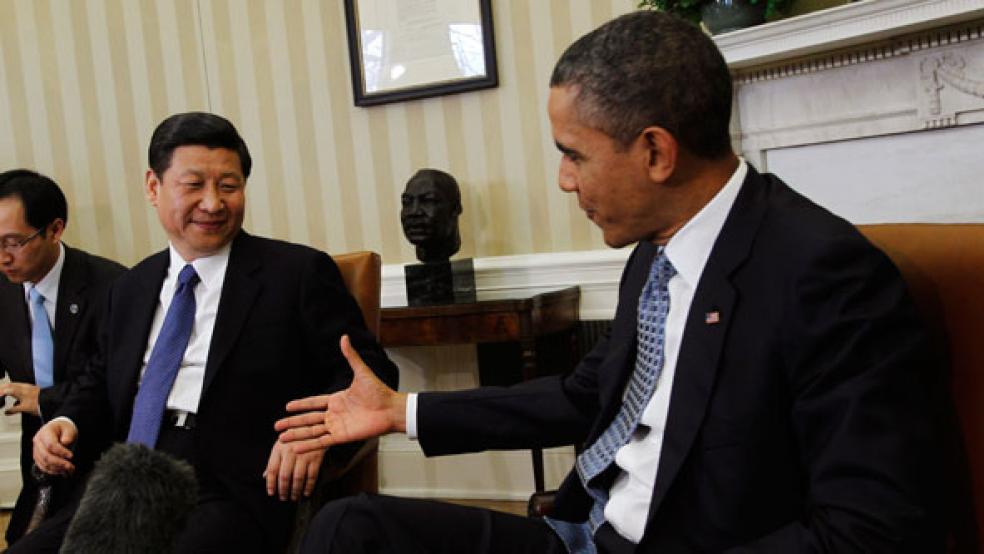President Obama can hit the reset button with China on Friday.
He meets in Rancho Mirage, CA for the first time with Xi Jinxing, who became the Chinese president at the end of last November. Of course, their casual “shirtsleeves” summit comes with some heavy baggage for the world’s two biggest economies to unpack.
Tensions continue over China’s cyber snooping. Intellectual piracy remains a concern for American businesses. Led by Sen. Sherrod Brown (D-OH), several lawmakers want to stop China from artificially depressing the value of its currency. And during the U.S. presidential race last year, the relationship swung toward the antagonistic, when Obama charged that China’s auto parts industry violated World Trade Organization rules.
Meanwhile, China holds $1.25 trillion worth of the U.S. national debt.
The dynamic between the United States and China is changing. The relationship of the past few decades—where China gorged on U.S. debt, while Americans bought Chinese-made goods—no longer seems viable. At the same time, the United States still depends on a rising China as a potential source of trade growth.
“This meeting has special significance because it may not produce a long list of what we call deliverables, but it will enable us to make much more cooperation and maybe deliver much more in the future,” said the Chinese Ambassador to the United States, Cui Tiankai, in a speech two weeks ago.
The Chinese economy has matured over the past few decades. An extended period of double-digit growth has given way to a Gross Domestic Product increase of just 7.8 percent last year. That’s still almost four times faster than U.S. GDP growth, but the American economy is roughly twice as large as China’s in a gap that is rapidly narrowing.
Higher wages are pushing factory jobs to Cambodia. Commodity prices have fallen as demand for finished goods has plunged. Its leadership faces a citizenry angered by a corrupt oligarchy. More than 30 of the delegates to China’s ceremonial legislative body are billionaires, according to the Beijing-based Hurun Report.
“It’s 50 percent successful already just by scheduling it and being there,” said John Frisbie, president of the U.S. China Business Council. “The new leadership in China is now in place. There is an active economic reform debate going on in China right now. The outcome in terms of specifics is still unclear. I also think that President Xi’s views on economic reform are largely unknown right now.”
Frisbie said he wants to know if Xi has an “appetite for far-reaching” economic reforms from Xi, or whether the Chinese government plans to preserve its incremental approach.
The extent of any progress in talks with China may start to build in July, when Secretary of State John Kerry and Treasury Secretary Jack Lew welcome their Chinese counterparts to Washington for the fifth “Strategic and Economic Dialogue” between the countries.
In terms of economic growth, this would mean removing barriers to investment for both nations. For example, the United States faces limits in terms of investing in the automotive sector or cloud computing. At the same time, Chinese companies are trying to acquire American firms, with the most recent example being pork producer Smithfield Foods.
Import tariffs and government procurement policies will likely also be part of follow-up discussions. Cyber security will play a critical role in the U.S. agenda. Departing National Security Adviser Tom Donilon outlined the administration’s interests in a March speech to the Asia Society in New York.
"First, we need a recognition of the urgency and scope of this problem and the risk it poses—to international trade, to the reputation of Chinese industry and to our overall relations,” Donilon said. “Second, Beijing should take serious steps to investigate and put a stop to these activities. Finally, we need China to engage with us in a constructive direct dialogue to establish acceptable norms of behavior in cyberspace."
There is also a question as to whether China—with its population of 1.34 billion—can continue its economic climb indefinitely. The Organization for Economic Co-operation and Development forecast in March that China will supplant the United States as the world’s biggest economy in 2016. The United States—with its population of 314 million—would still have a higher GDP per capita.
In their new book “Balance: The Economics of Great Powers from Ancient Rome to Modern America,” economists Glenn Hubbard and Time Kane note that Japan and South Korea both approached the per capita wealth of the United States but did not exceed it.
“We should anticipate that the experience of China will be the same as well—approach, not surpass,” they wrote.
Harvard University professor Larry Summers echoed the perspective of those Republican-affiliated economists at a breakfast this week hosted by The Wall Street Journal. A former Treasury secretary for Bill Clinton and economic adviser for Obama, Summers cautioned against assuming that China’s rise is inevitable.
“No one can forecast with confidence the future of the Chinese economy,” he said. “In retrospect, U.S. alarmism about Japanese growth peaked at just about the same point that the Japanese competitive threat to the American economy peaked. … And I think that U.S. policymakers would do well to recognize that there’s an enormous range of uncertainty about possible Chinese outcomes and that sustained, rapid growth and greater competitive threat is one of the possibilities, but it is by no means the only possibility.”

